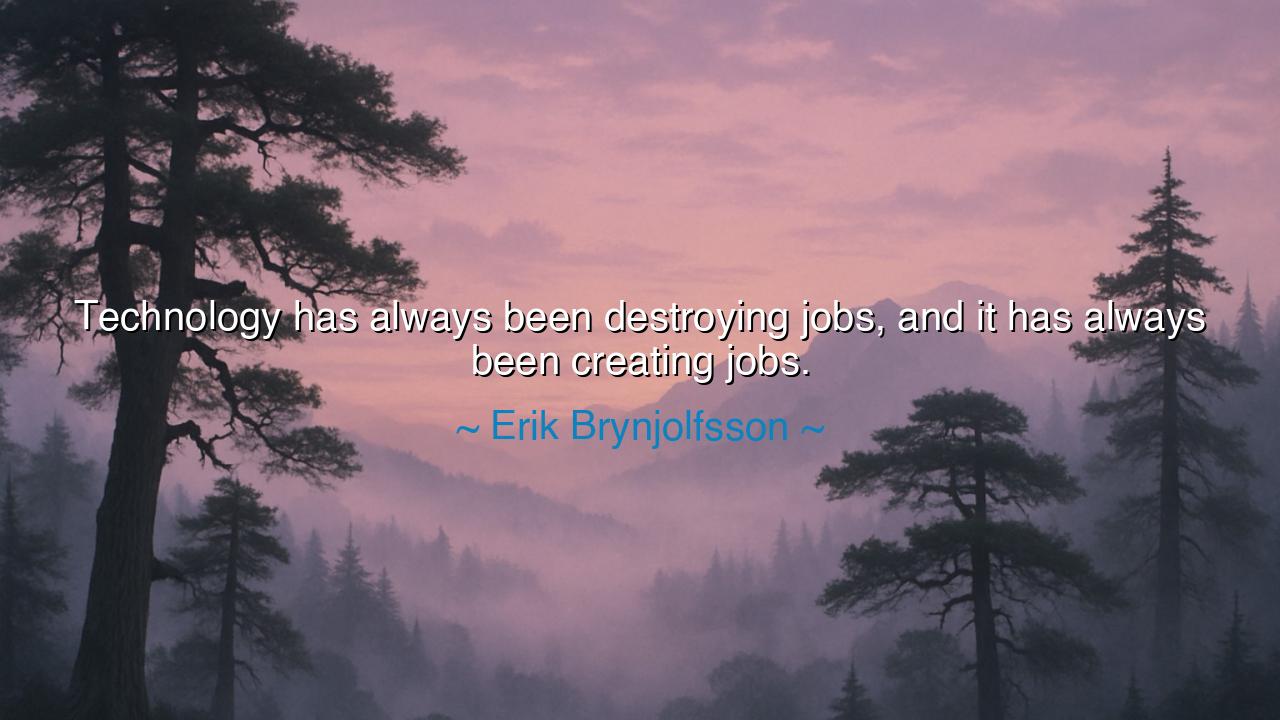
Technology has always been destroying jobs, and it has always






Hear, O children of labor and seekers of destiny, the words of Erik Brynjolfsson, who declared: “Technology has always been destroying jobs, and it has always been creating jobs.” This is no contradiction, but the eternal rhythm of progress. For every new tool that mankind has forged has ended one way of life and opened the door to another. The plow replaced the hoe, the engine replaced the horse, the computer replaced the clerk—but with each ending came a beginning, with each loss a new horizon.
The origin of this truth lies deep in the story of civilization itself. When the Industrial Revolution swept through Europe, millions feared the iron machines that thundered in factories. The weavers of old, who had spent their lives at the loom, found themselves displaced, their craft rendered obsolete by the tireless clatter of spinning frames. They rose in fury as the Luddites, smashing machines in protest of their lost livelihoods. Yet from the ashes of their labor rose new trades: engineers to build the machines, mechanics to maintain them, managers to organize vast factories. The old was destroyed, but the new was born.
Consider, O listeners, the coming of the automobile. The carriage driver, the stable boy, the blacksmith shoeing horses—many lost their purpose. Yet in their place arose the driver, the mechanic, the factory worker, the oil refiner, the road builder. Entire industries sprang forth where once only a few trades had lived. Jobs were destroyed, yes, but more were created, weaving together the modern world we know today.
The ancients, too, knew this truth in their own way. When bronze replaced stone, the old toolmakers saw their crafts vanish, yet the new metalworkers rose to prominence, shaping weapons and plows that changed the destiny of nations. When writing was born, the oral storytellers feared their words would be forgotten, yet from writing came scribes, historians, and libraries that preserved memory for a thousand generations. Always the cycle continues: death and rebirth, destruction and creation, loss and renewal.
Brynjolfsson’s words carry both comfort and warning. They comfort us in reminding us that while technology may shatter the familiar, it also sows the seeds of new opportunity. But they warn us, too, that we must not stand idle. For the new jobs do not appear for those who cling blindly to the past, but for those who adapt, who learn, who seize the tools of the future with courage. The weaver who learned to operate the loom prospered; the scribe who learned to print thrived. Those who refused to change were left behind in the ruins of yesterday.
The lesson, then, is clear: do not fear technology, but do not resist it blindly. Embrace the changes it brings, and prepare yourself for the new roles it creates. If your craft begins to fade, do not despair, but ask: what new craft is being born from this fire? Seek always to learn, to adapt, to grow, for the jobs of tomorrow belong to the learners of today.
Practical actions flow from this wisdom. Learn new skills, even when old ones seem secure. Teach your children not only the ways of the present but the curiosity to master the future. Support education, training, and innovation, so that society moves not with fear, but with readiness. And above all, remember: every tool is both a destroyer and a creator. The hammer may break stone, but it also builds the temple. The computer may end one job, but it births a thousand more.
Thus do we honor the words of Erik Brynjolfsson: that technology has always destroyed and always created, and that this cycle is not doom but destiny. Carry this teaching, O children of tomorrow, into your lives. Fear not the fall of old ways, for they make way for new horizons. Be ready, be willing, and be bold—for the future belongs not to those who wait, but to those who rise to meet it.






AAdministratorAdministrator
Welcome, honored guests. Please leave a comment, we will respond soon